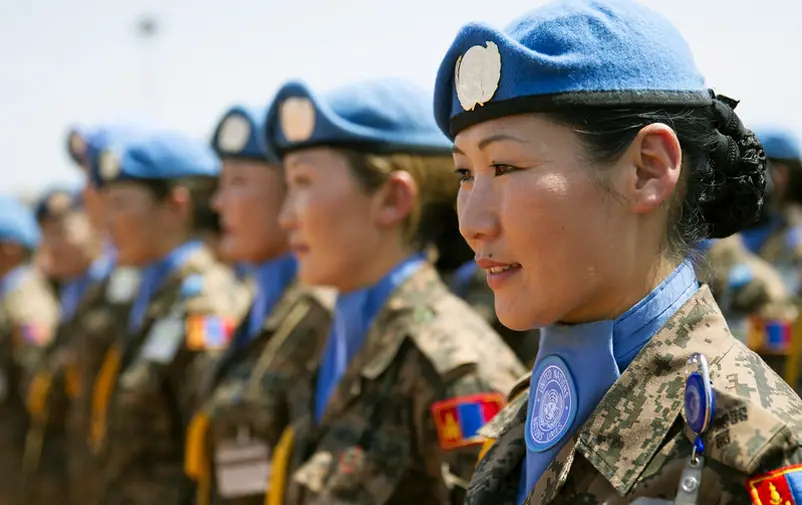
Photo: UN Photo/Martine Perret
– None of the peacekeeping missions has closed and halted operations. All of them continue to work, to varying degrees. And we continue to recruit personnel so that we have well-prepared experts to second, when the situation changes, says Niklas Lindskog, head of the International Missions and Deployment Unit at the FBA.
FBA has approximately 80 civilian experts on secondment right now, working within the field of peace, security and development. Half of them are currently performing their work from Sweden. Planning, analysis, coordination and some support activities can be carried out without being on site, and increased digitalization is transforming the work of the peace missions, just as in many other job sectors.
– Many of our secondees deployed to UN, EU and OSCE headquarters can remain at their locations. But for personnel deployed to field operations, where the mandates often require staff to patrol among the local population and have contact with both civil society organizations and local authorities, the shift is more significant, says Lisa Buijsse, desk officer at the FBA. She adds:
– The peacekeeping missions that provide training and advice have been more affected in their way of working by the pandemic outbreak. Some activities have been temporarily paused, while others can be carried out with the help of digital solutions, which we see as very positive.
The impact of the pandemic differs between continents, and the host countries of the peacekeeping missions have their own restrictions that apply to mission personnel. There are different quarantine rules, entry rules and, not the least, evacuation possibilities. It all has to be taken into account, even more so than under ordinary safety-related circumstances, especially when it comes to field operations in high-risk areas.
Unlike the EU and the OSCE, the UN has its own capacity for transports and medical evacuations, as well as previous experience from operating during severe outbreaks of Ebola in Liberia, Sierra Leone and the Democratic Republic of Congo, and cholera in Haiti. The EU and the OSCE have the capacity to perform evacuations, but not to carry them out by themselves.
Some host countries have waived staff contributions from countries severely affected by Covid-19 according to the peacekeeping mission rotation system. To reduce the risk of spreading the virus to the local population in the countries concerned, as well as spreading it among peacekeepers, the UN has decided to temporarily halt the shift of personnel. Only staff with functions that are deemed critical for the peacekeeping missions to operate and fulfil their mandate are staying at their positions.
– In many cases, it's a balancing act, because the presence of a peacekeeping mission is vital for the stability of the country and the region where it is deployed, to provide support for peace processes and to protect civilians from violence. It sends an important political signal to stay, says Anna Wikner, head of the Department for Missions, Elections and Deployment at the FBA. She continues:
– At the same time, the UN, the EU and the OSCE – and the FBA as a seconding agency with employer responsibilities - must also reduce the risk of staff being infected or spreading the virus, in addition to the usual obligations to protect the personnel.
The pandemic has apparent negative effects on health development in the world. It has also given a severe blow to the global economy, which has led to rising unemployment and increased poverty. In some countries, this is likely to lead to social and political unrest.
The presence of the international community is a significant factor for actors seeking to destabilize a country, hinder elections, spoil a peace process or in other ways affect the course of events in line with their interests.
The presence in the field gives international peacekeeping missions eyes and ears on the ground. Essential reasons for deploying personnel are that patrols easily can reach and talk to different actors, make agreements, curb escalating conflicts at the local level, and protect the civilian population. Conflicting parties are aware that violations of agreements will be documented and reported, allegations looked into, and information verified or dismissed. Other tasks for a peacekeeping mission can be to provide humanitarian assistance, protect important infrastructure and support the host country's institutions and local authorities.
In Ukraine, the Special Monitoring Mission (SMM) run by the Organization for Security and Cooperation in Europe (OSCE) is deployed, and in Georgia, the EU Monitoring Mission, (EUMM). Both missions receive extensive personnel contributions from Sweden, to be able to staff patrolling teams that make observations and gather information, among other things.
– Both monitoring missions have been forced to adapt their patrolling and limit their contacts with different actors, as well as the local population, as a result of the spread of the virus and the restrictions that the pandemic outbreak has imposed. Still, it's possible to maintain certain monitoring activity and documentation of what's happening on the ground, Niklas Lindskog says.
Photos: The UN peacekeeping mission in the Democratic Republic of Congo, MONUSCO.
MORE FROM HOME
What does research tell us about strategic civil-military leadership in UN integrated missions? The recent FBA research brief "Mission Leaders: An Evidence-based Assessment” presents seven policy recommendations.
2025-07-01 13:34FBA has both increased and adapted its work in Ukraine in the wake of Russia's invasion.
FBA in UkraineKlara Grenhagen works as a specialist at FBA's Africa unit with a focus on dialogue, reconciliation and peace processes.
More about our expertsFBA is part of Sweden’s development aid within the area of peace and security
Read more about the countries where we work